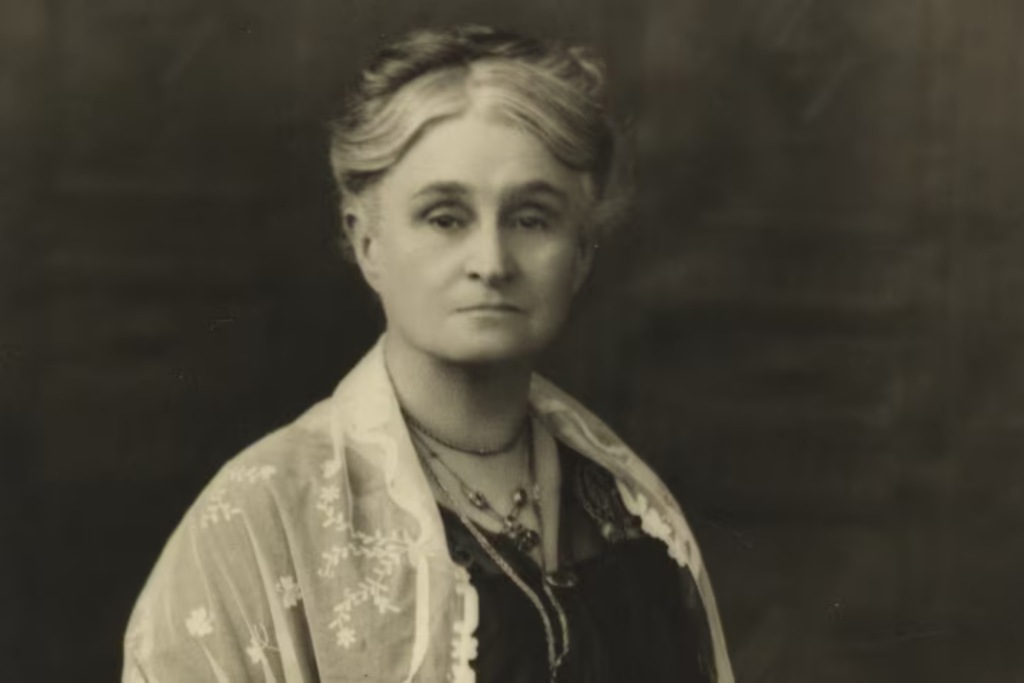In 2024, as many Australians begin to engage more deeply in conversations about domestic, family and sexual violence, it might seem unlikely that we could learn much from a parliamentarian elected in 1921—even if she was the first woman elected in Australia and only the second in the entire Commonwealth. But the issues we face today were foreshadowed by the warnings and advocacy of Edith Cowan over a century ago.
Edith Cowan was born into a conservative family, a member of the Nationalist Party and a devout Anglican—not exactly a picture of progressive politics, even for her time. However, she was a fierce advocate for single mothers, sex education in schools, housewives’ right to unionise, and the right for women (read: white women) to vote. As soon as she was eligible, she ran a whirlwind parliamentary campaign built on a long career of social work and volunteering.
Cowan was a fierce advocate for women and children and was among the first women appointed as a justice in the WA Children’s Court. Her voice only grew stronger in the Legislative Assembly. What she never openly discussed, however, was how personal these issues were to her—how her childhood had been scarred by the loss of her mother and sibling during childbirth, and how her father was hanged for the brutal murder of his second wife.
Kenneth Brown, Edith Cowan’s father, led a turbulent life filled with violence, excessive drinking and gambling. In 1876, while heavily intoxicated, Brown murdered his second wife, Mary Ann Tindall. His prior dangerous behaviour had flown under the radar as he returned to Western Australia from New Zealand, where he had been charged with threatening to shoot Mary—also while drunk. Trapped in an abusive marriage, Mary had little choice but to follow Brown to Geraldton, where he ultimately killed her. It took a remarkable three trials to convict him, as the first two juries, filled with his peers, failed to reach a verdict.
Orphaned before the age of fifteen, Edith Cowan had witnessed her father and other male figures in her family decline into alcoholism, gambling, and violence. She saw the women around her suffer the consequences of government inaction. And these women needed a voice.
Jess Hill and Michael Salter argue that the suffrage movement was framed as a way for women to protect themselves from male violence, referring to this cartoon. In brief, their groundbreaking paper on primary prevention challenges the government’s reliance on improved gender equality as the cure-all to reducing domestic violence, rather than a range of more targeted and immediate measures.
On closer examination, the 1891 cartoon digs deeper as well. Yes, it depicts men perpetrating violence which is enabled by inequality, but it also highlights the deliberate mechanisms they use—’whiskey,’ ‘seduction,’ ‘gambling,’ and ‘cruelty.’ The term ‘seduction’ may cause a scoff, but we’re now seeing dangerous connections between sexual violence and a largely unregulated pornography industry, which gives young boys access to increasingly misogynist and violent content.
Other industries that enable and profit from gendered violence—such as alcohol, gambling, and social media—are coming under increased scrutiny. A rapid review of prevention approaches by an expert panel recently highlighted harmful industries as a potential area for improved prevention. Their report has spurred National Cabinet to announce a $4.7bn package over the next 5 years to address gendered violence and domestic abuse.
Despite numerous Australian studies already showing the links between gambling, alcohol and domestic violence, as well as increased public demand for decisive action, we still have a long way to go—the Albanese government is facing criticism for not taking a tougher stance against gambling ads, and Michael Salter has recently revealed that he was asked to remove the data about alcohol in his research on violence against women.
“If we can afford to spend enormous amounts yearly in drink, and only a moderate amount on education, there is something wrong with our point of view.”
– Edith Cowan
It will come as no surprise that Cowan was a strong opponent of both alcohol and gambling. She supported prohibition, although she acknowledged it wasn’t practical in the short-term, arguing that “we have to go gradually, step by step, and the public must go with us.” Her views were often considered radical in parliament. She believed that the law should “constitute an ideal for the future.” And since her time, Australia has introduced targeted and forward-thinking preventative measures in a number of areas, from reducing smoking rates to implementing gun reform and tackling the HIV crisis.
“I have always felt it to be a good thing if sometimes the statutes are a little ahead of the ideals for them to live up to.”
– Edith Cowan
More than a century ago, Edith Cowan recognised the harmful, under-regulated structures linked to violence in our society. Mary Ann Tindall’s story mirrors many experiences today, where victim-survivors and dangerous perpetrators are not taken seriously, even when alcohol is clearly involved. This is especially true for First Nations women, who are often over-policed yet under-protected.
Whether harmful industries are seen as causes, contributors, or accelerants of domestic violence, they are clear links in a chain that must be broken—places where circuit breakers are urgently needed, particularly for violent offenders exploiting these systems.
Cowan’s legacy serves as both a guide and a call to take bold, preventative action against violence today and to support the children affected by it.
We cannot hope to raise good men of tomorrow if we ignore the men of today—whether they are the ones committing abuse or those driving the change we so desperately need. Perhaps some men will be both.


